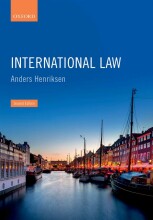Peaceful settlements of international disputes
10 important questions on Peaceful settlements of international disputes
What is the role of the two pillars in the peaceful settlement of disputes?
- Art. 2(3): disputes must be settled by peaceful means.
- The manner in which the principle is given expression is through Chapter 6. - Art. 2(4): limitation on the use of force
- The manner in which the principle is given expression is found in Chapter 7.
What are the means for dispute settlement and what are the differences?
- Diplomatic means: negotiation, mediation, conciliation
- The outcome is a recommendation.
- If there is a third party engaging, the outcome is based on consent. - Legal means: arbitration and judicial settlement
- The outcome, by a third party, is binding.
What are the means of assisting in dispute settlement, and give two examples.
- Good offices: meant to facilitate communication between the parties and to provide with a safe and conducive environment in which settlement can be sought. You provide the room but don't go with them into the room.
- Algeria and France: good offices provided by Switzerland. - Fact-finding: meant to facilitate a solution to a dispute by objectively elucidating the facts.
- The Red Crusader: was the fishing in the territorial waters or not, and therefore allowed the hot pursuit?
- The Doggar Banks
- Higher grades + faster learning
- Never study anything twice
- 100% sure, 100% understanding
Through which means of dispute settlement transpires 90% of all settlements and why are they preferred by stronger States?
Negotiation: direct dispute settlement, without the intervention of a third party.
- Informal
- No fixed rules and no specific outcome
Stronger States van bring to bear their influence and resources to the process as to gain a favourable outcome.
Normative understanding of the system which does not take into account the power relations. Weaker party will consent for fear that this is better than the prospect of not taking it up. Normatively consent, but is this really true?
Explain mediation as a way of peaceful settlement of disputes.
Third party involvement meant to facilitate dialogue between the parties by providing information and suggestions; identifying and exploring the aims of the parties; and proposing possible solutions.
- Third party can have influence by placing pressure, but the role and influence is limited.
- Recommends solutions but does not impose them.
Formulate the process of arbitration as a legal mean of dispute settlement.
Arbitration is the solution of international disputes through the ad hoc submission, by formal agreement of the parties, to the decision of a third-party, by means of contentious proceedings from which results a definitive judgment.
Arbitration can happen in two ways: Permanent Court of Arbitration or ad hoc basis.
The formal agreement is called a 'compromis'.
In which way gives the ICJ body to the equality of arms principle?
What is the jurisdiction of the ICJ?
- Disputes between States (contentious jurisdiction)
- Advisory opinions requested by organs and subsidiary organs of the UN
There are three means of allowing parties to consent to the contentious jurisdiction of the ICJ.
- By ad hoc agreement
- By way of a treaty which includes a clause to that effect (compromissory clause)
- By joining the 'optional clause' system
Explain the way reservation to the optional clause system work.
States may determine in their Declaration the extent to which the ICJ will have jurisdiction to deal with disputes. Give consent to the ICJ Statute and consent to the Optional Clause system. In the consent to the Optional Clause system you have the option to limit the consent to the dispute (=reservation).
Governed by the principle of reciprocity: the party that is seeking to access the court has a reservation that can be used against it, by denying its jurisdiction.
You may accept jurisdiction, but if the other party hasn't accepted it, that party cannot invoke it.
The question on the page originate from the summary of the following study material:
- A unique study and practice tool
- Never study anything twice again
- Get the grades you hope for
- 100% sure, 100% understanding





























